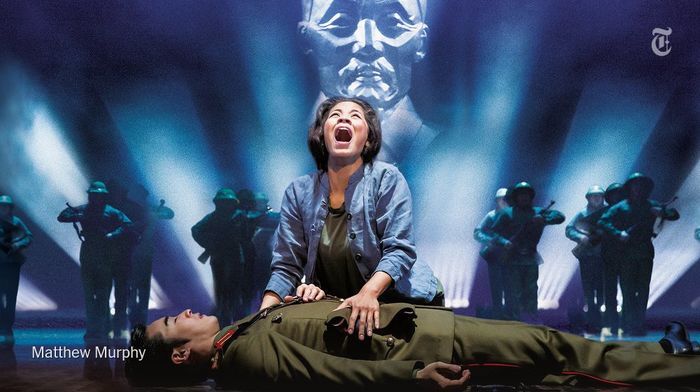Love and self-loathing in Ladbroke Grove: self-acceptance in The Deep Blue Sea
Anna Mahtani explores the perhaps unlikely theme of self-acceptance as it appears in Terrence Rattigan’s devastating love-story-gone-awry, The Deep Blue Sea.
Content Note: This article contains discussion of suicide.
When you think of plays celebrating self-love you might think of Shirley Valentine, Wicked, or more recently Fleabag, but Rattigan’s intimate explorations of doomed relationships and desperate housewives most definitely laid the groundwork for these later shows. Terence Rattigan’s The Deep Blue Sea (and no, I’m not talking about the shark horror trilogy) might not be the most obvious Valentine’s shout out. It opens on a failed suicide attempt for one. But, to me at least, when it was streamed over lockdown on NTLive, it was a godsend.
Set in a dingy bedsit in Ladbroke Grove, the play follows the immediate aftermath of Hester Collyer’s failed suicide attempt, as she tries to conceal, deny and even repeat the act. Almost a year earlier she left her husband for a once passionate, now crumbling affair with former fighter pilot Freddie. It’s an intensely tender look at love, and at the risk of sounding like one of Hester’s absurd neighbours, the play captures something essential about life, and how we live it. First staged in 1952, only three years after Rattigan’s own lover committed suicide, it’s deeply personal, and profoundly universal. Yet with its cast of sometimes ridiculous but always honest characters, there are moments of comedy throughout.
The context was first lockdown; the thrill of getting into Cambridge and relief of exams being cancelled were fading into reality. I was in a creative slump. Watching the National Theatre performances streamed on YouTube every week with my cousin had become a lifeline, yet even that was coming to an end. Directed by Carrie Cracknell, the show was one of the last streamed productions. It was invigorating. The staging, lighting and set design were so visually stunning, like something out of an Edward Hopper painting. The original play ends with Hester turning on the gas, only this time instead of inhaling the fumes, she lights the fire. Cracknell’s adaptation goes a step further, with Hester making herself a fried egg sandwich. It’s her first act of kindness to herself, first ounce of self-care. It’s the first thing she’s eaten all day. Through it we know that tomorrow, she’ll still be here.
Hester’s desperate fear of being unloved is what led her to marry the first man who asked, to run off with the first dashing young fellow to wink her way, and now, is what leads her to choose death rather than be alone. It takes until the last moments of the play for her to accept that ending the relationship is the only way she can move forward. Hester’s isn’t a sob story, though; she’s smart, funny, passionate and caring. But like Fleabag, her love for others is a mask for her deep-rooted hatred of herself. She anchors her happiness in Freddie and when he inevitably leaves, she’s left to drown.
“In showing us a character at her lowest ebb, Rattigan shows us that life, and self-love, are still possible.”
One of her neighbours, the former doctor Mr Miller, is the voice of stoic reason in the play. It’s him telling her that she should pursue her art (and through it, her life) – beyond hope, beyond despair – that saves her. He holds up one of her paintings, from when she was 17, from before she moulded herself into those she loves. She has talent, he tells her, only a spark but still, “the world is a dark enough place for even a little flicker to be welcome.” In showing us a character at her lowest ebb, Rattigan shows us that life, and self-love, are still possible.
The play doesn’t give us the immediate satisfaction of self-love; it’s no easy checklist or how-to guide, instead offering an authentic examination of how we move past self-loathing towards acceptance, how our fear of being alone is our biggest saboteur, and how to accept ourselves as who we are, not as who the world - and the other people in it want us to be. Love is great, magical, potentially world-changing, but to distort the words of Paul McCartney: love isn’t all you need. Whether you’re in a loving, crumbling, or downright non-existent relationship, Mr Miller’s words still ring true: “the only purpose in life is to live it”. If only Shakespeare’s Juliet had had a fried egg sandwich…
 News / Candidates clash over Chancellorship25 April 2025
News / Candidates clash over Chancellorship25 April 2025 News / Cambridge professor paid over $1 million for FBI intel since 199125 April 2025
News / Cambridge professor paid over $1 million for FBI intel since 199125 April 2025 Interviews / Dr Ally Louks on going viral for all the wrong reasons25 April 2025
Interviews / Dr Ally Louks on going viral for all the wrong reasons25 April 2025 Music / The pipes are calling: the life of a Cambridge Organ Scholar25 April 2025
Music / The pipes are calling: the life of a Cambridge Organ Scholar25 April 2025 Comment / Cambridge students are too opinionated 21 April 2025
Comment / Cambridge students are too opinionated 21 April 2025






